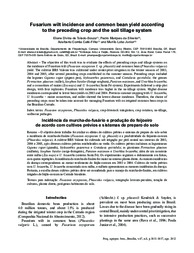Fusarium wilt incidence and common bean yield according to the preceding crop and the soil tillage system.
Fusarium wilt incidence and common bean yield according to the preceding crop and the soil tillage system.
Author(s): TOLEDO-SOUZA, E. D. de; SILVEIRA, P. M. da; CAFÉ-FILHO, A. C.; LOBO JUNIOR, M.
Summary: The objective of this work was to evaluate the effects of preceding crops and tillage systems on the incidence of Fusarium wilt (Fusarium oxysporum f. sp. phaseoli) and common bean (Phaseolus vulgaris) yield. The cultivar BRS Valente was cultivated under center.pivot irrigation in the winter seasons of 2003, 2004 and 2005, after several preceding crops established in the summer seasons. Preceding crops included the legumes Cajanus cajan (pigeon pea), Stylosanthes guianensis, and Crotalaria spectabilis; the grasses Pennisetum glaucum (millet), Sorghum bicolor (forage sorghum), Panicum maximum, and Urochloa brizantha; and a consortium of maize (Zea mays) and U. brizantha (Santa Fe system). Experiments followed a strip.plot design, with four replicates. Fusarium wilt incidence was higher in the no.tillage system. Higher disease incidences corresponded to lower bean yields in 2003 and 2004. Previous summer cropping with U. brizantha, U. brizantha + maize consortium, and millet showed the lowest disease incidence. Therefore, the choice of preceding crops must be taken into account for managing Fusarium wilt on irrigated common bean crops in the Brazilian Cerrado.
Publication year: 2012
Types of publication: Journal article
Unit: Embrapa Rice & Beans
Observation
Some of Embrapa's publications are published as ePub files. To read them, use or download one of the following free software options to your computer or mobile device. Android: Google Play Books; IOS: iBooks; Windows and Linux: Calibre.
Access other publications
Access the Agricultural Research Database (BDPA) to consult Embrapa's full library collection and records.
Visit Embrapa Bookstore to purchase books and other publications sold by Embrapa.

